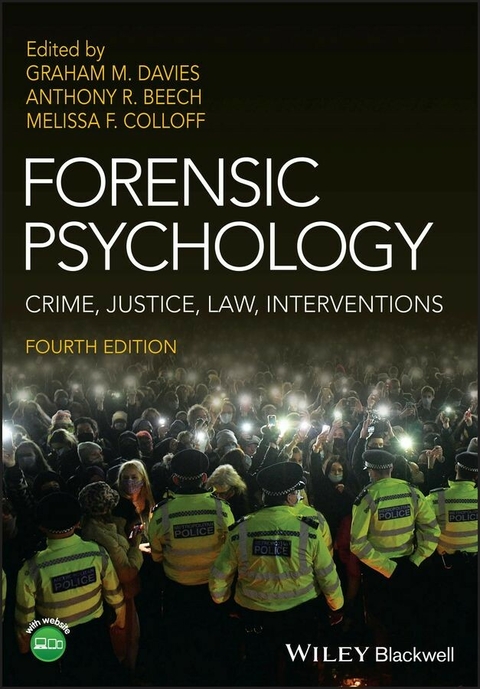
Forensic Psychology
Wiley-Blackwell (Verlag)
978-1-119-89200-7 (ISBN)
Highlighting the often-sizable gap between media myths surrounding forensic practice and reality, »Forensic Psychology« presents a broad range of topics within the field, including detailed treatments of the causes of crime, investigative methods, the trial process, and interventions with different types of offenders and offenses.
To aid in reader comprehension, this Fourth Edition is supplemented with additional online resource materials, including related links, multiple choice questions, and PowerPoint slides.
Authored by a wide range of experienced forensic psychology professionals and drawing on a wealth of experience from leading researchers and practitioners, »Forensic Psychology« includes information on:
- Psychological approaches to understanding crime and developmental and psychological theories of offending
- Contributions of neuroscience in understanding risk factors for offending and effects of interpersonal crime on victims
- Eyewitness evidence, psychopathy, interviewing witnesses and suspects, detecting deception, and offender profiling and crime linkage
- Interpersonal violence and stalking, judicial processes, safeguarding vulnerable witnesses, criminal responsibilities, and the role of the expert witness
- Rehabilitation of offenders, risk assessment, treating dangerous offenders, and interventions with female offenders and offenders with intellectual disabilities
With comprehensive coverage of the subject and its many important intricacies, the Fourth Edition of »Forensic Psychology« is essential reading for undergraduates’ first encounter with the subject area and is also an excellent introduction for more specialized postgraduate courses.
Professor Graham M. Davies, Department of Neuroscience, Psychology and Behaviour, University of Leicester, United Kingdom.
Professor Anthony R. Beech, School of Psychology, University of Birmingham, United Kingdom.
Dr. Melissa F. Colloff, School of Psychology, University of Birmingham, United Kingdom.
Contributors xix
Preface to the Fourth Edition xxiii
About the Editors xxv
About the Companion Website xxvi
Theory and Practice in Forensic Psychology 1
Graham M. Davies, Anthony R. Beech, and Melissa F. Colloff
Part 1 The Causes of Crime 25
Chapter 1A Psychological Approaches to Understanding Crime 27
Emma J. Palmer
Chapter 1B Developmental and Psychological Theories of Offending 49
David P. Farrington
Chapter 2 Psychopathy 77
Steven M. Gillespie and Carlo Garofalo
Chapter 3 Understanding Risk factors for Offending: The Contributions of Neuroscience 103
Lilia Psalta, Anthony R. Beech, and Adrian Raine
Chapter 4 Effects of Interpersonal Crime on Victims 137
Catherine Hamilton-Giachritsis and Emma Sleath
Part 2 Investigating Crime 173
Chapter 5 Criminal Investigation and Decision Making 175
Neil Shortland and Laurence Alison
Chapter 6 Eyewitness Evidence 199
Melissa F. Colloff, Heather D. Flowe, and Tia C. Bennett
Chapter 7 Interviewing Witnesses 233
Allison P. Mugno, Lindsay C. Malloy, and David J. La Rooy
Chapter 8 Interviewing Suspects 265
Erik Mac Giolla and Pär Anders Granhag
Chapter 9 Detecting Deception 289
Pär Anders Granhag and Maria Hartwig
Chapter 10 Offender Profiling and Crime Linkage 313
Jessica Woodhams, Matthew Tonkin, and Amy Burrell
Chapter 11 Interpersonal Violence and Stalking 337
Louise Dixon and Erica Bowen
Chapter 12 Terrorism 367
Max Taylor
Part 3 The Trial Process 393
Chapter 13 Judicial Processes 395
Jacqueline M. Wheatcroft
Chapter 14 Safeguarding Vulnerable Witnesses 425
Graham M. Davies and Rachel Wilcock
Chapter 15 Criminal Responsibility and Legal Insanity 457
John M. Fabian
Chapter 16 The Role of the Expert Witness 481
Daniel T. Wilcox and Leam A. Craig
Part 4 Dealing with Offenders 507
Chapter 17 The Rehabilitation of Corrections Clients: Good Lives and Risk Reduction 509
Tony Ward, Gwenda M. Willis, and David S. Prescott
Chapter 18 Risk Assessment 539
Anthony R. Beech and Ruth M. Hatcher
Chapter 19 Treating Dangerous Offenders 569
Leigh Harkins, Adam J. Carter, Andrea Jackson, and Jayson Ware
Chapter 20 Interventions with Justice-Involved Girls and Women 603
Franca Cortoni and Nathalie M. G. Fontaine
Chapter 21 Interventions for Offenders with Intellectual Disabilities 627
John L. Taylor and Ian Freckelton
Chapter 22 Working with Mental Health Issues in People Who Have Offended 659
Jason Davies and Claire Nagi
Chapter 23 Modifying Risk Factors, Building Strengths 691
Corine de Ruiter and Vivienne de Vogel
Part 5 Forensic Psychology: Emerging Issues, Future Challenges 713
Chapter 24.1 The Utility of Cyberpsychology and Forensic Cyberpsychology 715
Mary Aiken
Chapter 24.2 Data-Driven Policing 719
Kari Davies
Chapter 24.3 The Cognitive Neuroscience of Eyewitness Identification 723
John T. Wixted
Chapter 24.4 Targets of Explanation in Correctional and Forensic Psychology 727
Tony Ward
Chapter 24.5 Future Directions in Treatment: What Might Work for Whom, Where, and When? 730
Jason Davies
Chapter 24.6 Cultural Responsivity Considerations in the Assessment and Treatment of Justice-Involved Populations 734
Ida Dickie
Chapter 24.7 Future Approaches to Personality Difficulties, Trauma, and Reducing the Risk of Reoffending 737
Jackie Craissati
Index 741
| Erscheinungsdatum | 28.01.2024 |
|---|---|
| Reihe/Serie | BPS Textbooks in Psychology |
| Verlagsort | Hoboken |
| Sprache | englisch |
| Maße | 178 x 252 mm |
| Gewicht | 1179 g |
| Einbandart | kartoniert |
| Themenwelt | Geisteswissenschaften ► Psychologie |
| Medizin / Pharmazie ► Medizinische Fachgebiete ► Psychiatrie / Psychotherapie | |
| ISBN-10 | 1-119-89200-7 / 1119892007 |
| ISBN-13 | 978-1-119-89200-7 / 9781119892007 |
| Zustand | Neuware |
| Informationen gemäß Produktsicherheitsverordnung (GPSR) | |
| Haben Sie eine Frage zum Produkt? |
aus dem Bereich


